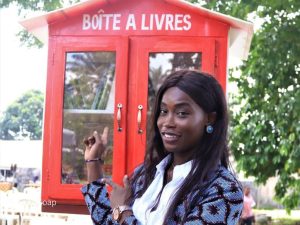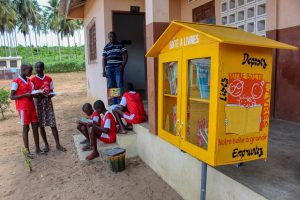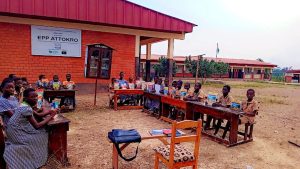 Cameroon : Dr. Yasmine Ndassa, the research scientist turned data storyteller
Cameroon : Dr. Yasmine Ndassa, the research scientist turned data storyteller
 Julien Ngum Che : advocating for the rights of displaced women and youth in Cameroon
Julien Ngum Che : advocating for the rights of displaced women and youth in Cameroon
 Chilufya Mutale Mwila, the Zambian entrepreneur driving financial inclusion across Africa
Chilufya Mutale Mwila, the Zambian entrepreneur driving financial inclusion across Africa
 Wangari Muchiri, the Kenyan engineer committed to accelerating the ecological transition in Africa
Wangari Muchiri, the Kenyan engineer committed to accelerating the ecological transition in Africa


For six years, Rita Dro has been installing book boxes in rural areas, as well as in neighborhoods of major cities in Ivory Coast. The Ivorian journalist and blogger decided to set up these micro-libraries to encourage Ivorians, especially children, to read. To date, her “book boxes” have spread throughout the country, reaching more than a hundred locations and impacting more than 40,000 children.
“Our book box,” a concept imported by Rita Dro to Ivory Coast, is the story of a journalist’s passion for books, but also a desire to improve education in her country. In 2019, when she discovered the concept of “book boxes” while browsing Facebook—an idea that originated in the West in the 2000s—she was immediately fascinated. An avid reader, the blogger decided to use it to share all the books she had accumulated over the years. “On Facebook, I read the story of an American man who had lost his mother, an avid reader who used to share her books with her neighbors. When she died, her son wanted to continue her tradition, but at the same time, he had to go back to work. That’s how he came up with the idea of installing a book box in front of his mother’s house, allowing neighbors to help themselves freely,” she tells Africa Women Experts.
In February 2019, she set up a book box in front of her house and began sharing books with the neighborhood children, who were intrigued by the initiative. “We had an agreement with the children: for every book they borrowed, they had to write a summary to reassure me that they had actually read it,” she says. As she read through the summaries, she realized how poor the children’s writing skills were. “I noticed that the 8th graders were unable to express themselves in public. When they did a dictation, it was full of mistakes. So I decided to help them. Two Saturdays a month, we would gather at my house with a dozen children to work,” she says.
As a blogger, she shared her various activities on social media. The initiative fascinated internet users, including those who were initially skeptical. She was then contacted by individuals in Yopougon, Abidjan, and elsewhere to set up mini libraries in their homes. Publishing houses and individuals also rallied to the initiative by donating books. Institutions mobilized and committed to supporting the project by financing the installation of more than twenty book boxes.
Bringing books to rural areas
 .
. 
In addition to making books accessible, Rita Dro has turned the concept of “book boxes” into a solution for improving education of young people in rural areas that lack libraries and where school dropout rates are still very high. For the past three years, she has been working to set up book boxes and monitor children in rural communities. In partnership with the International Cocoa Initiative Foundation, funded by chocolate manufacturers to combat child labor in cocoa production areas in West Africa, she has been installing book boxes in rural communities since 2022 to provide education to the children of cocoa farmers. “The people in these areas aspire to a quality education for their children, and such an education involves developing children’s reading skills. During the first year, we installed 33 book boxes funded by the foundation; the following year, we increased that number to 46 micro-libraries,” she explains.
In addition to installing book boxes in schools, the initiative involves several activities, including raising parents’ awareness of the impact of reading on their children, weekly writing workshops led by local coordinators appointed by the “book boxes” association over a six-month period, and a reading competition. “We aim to inspire wonder in children. Living in rural areas, they don’t often have the opportunity to visit the city. So we bring them and their parents together in Yamoussoukro or Abidjan, where they stay in large hotels offering modern services. The goal is to create pleasant memories associated with reading and to inspire them. At the end of the first edition of this competition, the children who participated became our salespeople, promoting the initiative to their friends,” she explains.
During the holidays, the association also offers activities such as the “Neighborhood Dictation,” now in its second year. It assesses the impact of reading on children’s writing skills. According to the journalist, this initiative is intended as a solution to reverse the lack of interest in reading among Ivorian children, confirmed by studies that ranked the country second to last among countries where children in second grade did not master reading. “This initiative is a solution that we are offering to the Ivorian government through the Ministry of Education, but also to individuals and large companies that want to provide quality education to the children of their producers,” she emphasizes.
More than 40,000 children impacted in six years
Despite initial difficulties, particularly due to the reluctance of many to embrace her project, Rita Dro has been able to install around 100 book boxes in six years and impact more than 40,000 children. “The impact is real. After several months of follow-up, children who couldn’t read a sentence are now able to read a chapter. They are able to read in front of everyone with confidence. We have also noticed that the children who participated in our workshops performed better in the middle school entrance exam,” she says. In addition, the initiative, which now has association status, has given jobs to a dozen people and also hired dozens of volunteers who help promote reading.
Today, the Ivorian woman aspires to install more book boxes throughout her country, taking advantage of the boom in real estate projects to encourage developers to integrate mini libraries into their construction plans. Her goal is also to share the “Ivorian” experience of the book box concept internationally to raise awareness and replicate this initiative in other West African countries that also face educational challenges.
Danielle France Engolo